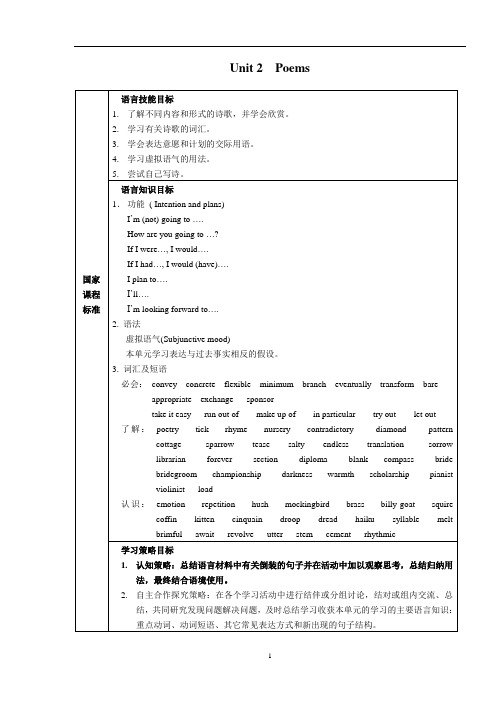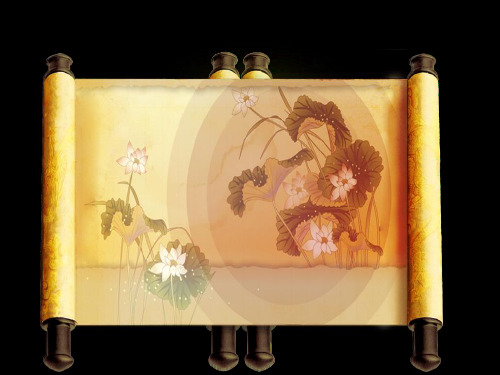BOOK 6 UNIT 2 POEMS (选修六第二单元)
- 格式:pptx
- 大小:149.17 KB
- 文档页数:20




高中英语学习材料(灿若寒星*制作整理)Book 6 Unit 2 PoemsPart 1 Vocabulary1. Can you r_______ any poems you have read in high school, either in Chinese or in English?2. I think you’d better consider other a____________ of the matter.3. Some poems try to c____________ certain emotions.4. The n_________teacher made the children sit bolt upright.5. Mind your manners, guy! I want no r___________ of your bad behavior.6. The lady has a very expensive ring with a d___________ in the centre.7. Somebody dreamed of after retirement moving to a remote c___________ in the countryside.8. If you always t___________ others like that, you'll forfeit the good opinion of your friends.9. There is e__________ work to do when you have children in the house.10. He t_____________ the speech from Spanish into English.11. The company’s head office is in the city, but it has b________ all over the country.12. Your room looks old. Why not t_____________ it by painting it?13. He told me with s_____________ that his mother was very ill.14. His casual clothes were not a_____________ for such a formal occasion. (The government a_____________ a large sum of money for building schools. The minister was found to have a_____________ government money.)15. If you are lost in the wood, it's very handy to have a c_____________ with you.16. The cloth has a p___________ of flowers on the dress material.17. John was touched by the w_____________ of their welcome.18. The truck was carrying a l_________ of bananas.Part 2 Useful Phrases1.传达某种感情_____________________2.使小孩快乐_______________________3.童谣中一种常见的形式_______________4.向地主哈腰_____________________5.熬夜______________________6.筋疲力尽______________________7.周而复始______________________8.落花__________________________9.整个村庄充满着欢乐的儿童________________10.把……转换成……___________________11.把……翻译成……________________12.绊倒____________________________Part 3 Complete the following sentences according to the texts.1. There are various reasons _______ people write poetry.人们写诗有着各种各样的理由。


教案1 Unit2 PoemsWarming up and ReadingTeaching material: NSEFC Book 6 —— Unit 2Teaching Aims: To cultivate students’ interest of poetry and improve their reading skills. Teaching Important & Difficult PointsHow to help the students to grasp and remember the detailed information of the reading material. Teaching aids: a tape recorder, a projector, Slides and PicturesTeaching ProcedureStep 1 Warming up. Match the following information.Li Bai Song DynastyDu Fu Tang DynastyFan Zhongyan Tang DynastyMeng Haoran ModernGuo Moruo ModernMao Zedong Tang DynastyByron AmericaShelly EnglandEmerson EnglandTagore GermanyGoethe IndiaStep 2 Brainstorming1 Discuss the reasons why people write poems.2 Fast reading Scan the passage and answer the following questions.1). What is the main topic of the reading passage?2). What five kinds of poems does the reading passage talk about?Keys: 1) different forms of English poems2) nursery rhymes, list poems, cinquain, haiku, Tang poems.T: Now let’s read the following five poems and finish tasks.1 Listen to Poem A and pay attention to its rhyming lines and words.Read the poem by yourself again and answer the following questions.1). What’s the baby’s father going to bu y if the looking-glass gets broken?2). What is Papa going to buy for the baby if that billy-goat runs away?3). What are the features of it?Keys:1). a billy –goat2). another billy-goat3). It has strong rhythm and rhyme and has a lot of repetition.2 Poem CQuestions1). Did his or her team win the game?2). Why his or her team didn’t win the game?3). Does the speaker really believe his or her own excuse? How do you know? Keys: 1). No, his or her team didn’t win.2). The players didn’t win because: Jack didn’t score that goal; they didn’t have enough time; they hadn’t trained hard….3). The speaker doesn’t really believe his or h er own excuses, because there has too many ifs…3 Poem D&E1). What subject is the speaker writing about?2). Does the speaker like the subject? Give a reason for your answer.4 T: We have enjoyed so many English poems. Some are traditional forms of English poetry but some are not, for example haiku. (It comes from Japanese).In fact English speaker also have borrowed from another kind of Asian poetry---Tang poems from China.Poem H at the bottom of this passage is a translation from the Chinese. Poem H 望夫石王健望夫处,江悠悠。